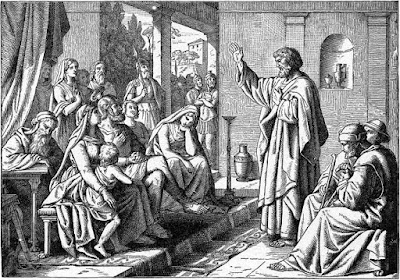 |
| Holy Trinity |
Bring to the Lord the sons of rams;
Bring to the Lord glory and honor.
Bring to the Lord the glory due His name;
Worship the Lord in His holy court.
The voice of the Lord is upon the waters;
The God of glory thundered;
The Lord is upon the many waters.
The voice of the Lord is strong;
The voice of the Lord is full of majesty.
The voice of the Lord shatters cedars,
And the Lord shall grind to powder the cedars of Lebanon;
And He shall grind them fine like the young bull, and like Lebanon,
But His beloved shall be like a son of unicorns.
The voice of the Lord cuts through fiery flames;
The voice of the Lord shakes the desert,
And the Lord will shake the desert of Kadesh.
The voice of the Lord causes deer to calve,
And uncovers the thickets;
And in His temple, everyone speaks of His glory.
The Lord shall dwell in the deluge,
And the Lord shall sit as King forever.
The Lord will give strength to His people;
The Lord will bless His people with peace. (Psalm 29:1–11 LXX)
Everyone who discusses divine matters in an orderly way so as always to hold the correct opinion concerning the Father, the Godhead of the Only-begotten, and the glory of the Holy Spirit, brings glory and honor to the Lord. And, because His providence penetrates even to the smallest things, he increases the glory who is able to give the reasons for which all things were created and for which they are preserved, and also for which, after this present stewardship, they will be brought to judgment. He who is able himself to contemplate each individual creature with clear and unconfused thoughts and, after having contemplated them himself, is able to present to others also the facts concerning the goodness of God and His just judgment, he is the one who brings glory and honor to the Lord and who lives a life in harmony with this contemplation. For, the light of such a man shines before men, since by word and work and through manly deeds of every kind the Father in heaven is glorified.…
We have learned in the creation of the world that there is water above the heavens, again, water of the deep, and yet again, the gathered waters of the seas. Who, then, is He who holds together these waters, not allowing them to be borne downward by their physical weight, except the Lord who established Himself upon all things, who holds sway over the waters? Perhaps, even in a more mystic manner the voice of the Lord was upon the waters, when a voice from above came to Jesus as He was baptized, “This is my beloved Son.” At that time, truly, the Lord was upon many waters, making the waters holy through baptism; but, the God of majesty thundered from above with a mighty voice of testimony. And over those to be baptized a voice left behind by the Lord is pronounced: “Go, therefore,” it says, “baptize in the name of the Father, and of the Son, and of the Holy Spirit.” Therefore, “The voice of the Lord is upon the waters.”
Basil of Caesarea, Homily on the Psalms 13.2–3
From this he prophesies the power imparted to the apostles.... The narrative of the Acts also teaches us things in harmony with this: we learn from there how at his ascension Christ the Lord addressed his holy disciples in the words, “Stay in this city until you have been clothed with power from on high.” Ten days later on the feast of Pentecost, “there came a sound from heaven like that of a violent wind blowing.” ... Now, he gives the name “voice” to the grace of the Spirit filling the apostles with power and might and rendering puny people magnificent. ... The choir of the sacred apostles received the grace of the all-holy Spirit in forms of fire, and were illuminated but not burnt. In the future life, the twofold operation of fire will be divided, illuminating the athletes of virtue and incinerating evildoers.
Theodoret of Cyrus, Commentary on the Psalms 29.5, 7



